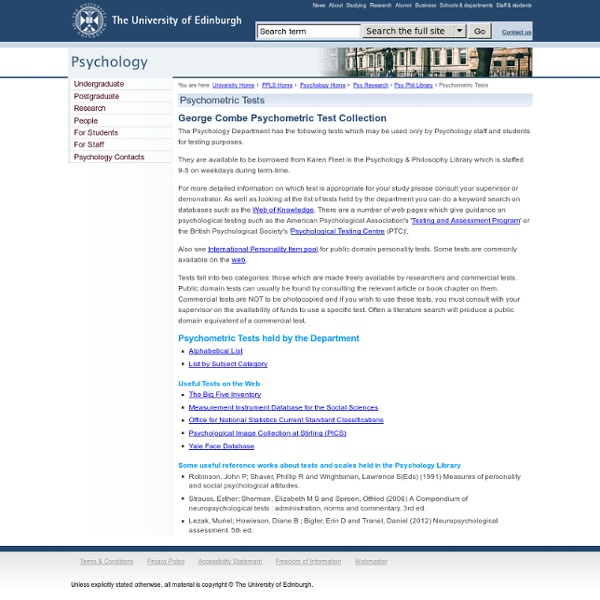Free, Scientific Personality Tests Online | Truity
Personality Pathways
Personality Club
Your Personality | Free Online Personality Tests and Quizzes
Abstract reasoning test - 123test.com
<div class="alert alert-block alert-error"><h4>JavaScript</h4> For full functionality of this site it is necessary to enable JavaScript. Here are the <a href=" target="_blank"> instructions how to enable JavaScript in your web browser</a>. </div> An abstract reasoning test measures your ability or aptitude to reason logically. Abstract reasoning tests are almost always a part of any job assessment or intelligence testing setup. So, improve your IQ score with this free online abstract reasoning test. The test consists of ten questions.
Holland's Six Personality Types | Career Key
According to John Holland's theory, most people are one of six personality types: Realistic, Investigative, Artistic, Social, Enterprising, and Conventional. Take the Career Key Test » Take the valid Career Key test to find out which ones you are most like and the careers and college majors that fit you best. The characteristics of each of these are described below: Realistic Likes to work with animals, tools, or machines; generally avoids social activities like teaching, healing, and informing others; Has good skills in working with tools, mechanical or electrical drawings, machines, or plants and animals; Values practical things you can see, touch, and use like plants and animals, tools, equipment, or machines; and Sees self as practical, mechanical, and realistic. Investigative Artistic Social Enterprising Conventional Go to Holland's Theory of Career Choice
PersonalDNA | Your True Self Revealed - Fast Fun Free Personality Tests
Integral Personality
Aptitude tests, Assesment & IQ Training – Aptitude tests online – Fibonicci
Personality test
A personality test is a questionnaire or other standardized instrument designed to reveal aspects of an individual's character or psychological makeup. The first personality tests were developed in the 1920s[1] and were intended to ease the process of personnel selection, particularly in the armed forces. Since these early efforts of these test, a wide variety of personality tests have been developed, notably the Myers Briggs Type Indicator (MBTI), the MMPI, and a number of tests based on the Five Factor Model of personality. Estimates of how much the industry is currently worth are between $2 and $4 billion a year.[2] Personality tests are used in a range of contexts, including but not limited to, individual and relationship counseling, career counseling, employment testing, occupational health and safety and customer interaction management. History[edit] Illustration in a 19th-century book depicting physiognomy. Overview[edit] There are many different types of personality tests.
Personality Test - Keirsey Temperament Website
What Animal are You? - The Animal in You Personality Test
The free five minute personality test!
Your Existing Situation "Needs a peaceful and quiet environment. Desires an affectionate and faithful partner who will spoil him and treat him with importance. Your Stress Sources Tries to hold back his normal enthusiastic and imaginative self in fear that he may get carried away by it and chase after unrealistic goals. Your Restrained Characteristics Current events leave him feeling forced into compromise in order to avoid being cut off from affection or future cooperation. "Struggles to make his demands clear, but feels ignored. Feels trapped in a helpless situation and is desperately seeking relief. Conceited and is easily insulted. Your Desired Objective Is in need of immediate rest and relaxation. Your Actual Problem "Tends to be too trusting, so he must protect himself from this or he runs the risk of being misunderstood or used by others. Your Actual Problem #2
Your True Self Revealed - Fast Fun Free Personality Tests
This is your private report page. If you wish to share your results with your friends and family, use the links below. You have not saved your results to your account yet. If this is your report page and you wish to save your results, click here to sign in. You are an Advocating Creator. personalDNA about you You are a Creator If you want to be different: how you relate to others You are Advocating Your Personal DNA Maps Here are personalDNA maps that uniquely represent your personality. Advocating Creator To add this map to your website or blog, copy/paste this HTML into the body of a blog post or web page: Your Personality Chart »Glossary of Traits This chart shows thirteen personality traits. want to save your report to a personalDNA account? PersonalDNA is one of many ATTAP websites. By linking your personalDNA information to your account, you give yourself access to your report all the time. Click here to create your account Or, if you already have a personalDNA account, click here to sign in



